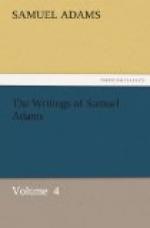Yesterday, this town made choice of the same gentlemen to represent them in the G. C. who had served them the last year, except that Mr. Lord1 is chosen in the room of Mr. Davis.2 No one doubts my personal regard for Mr. L., but I think it may be highly dangerous, and attended with very ill effects, to admit an undue influence of the Superintendent of Finance into the general assemblies of these states, and therefore could not help mentioning my objections, to such of the inhabitants as I had an opportunity of conversing with, against his agent’s being chosen a member of ours. The post is just going.
Your affectionate,
1 The town records appear to indicate that John Rowe should have been named in this connection.
2 Caleb Davis; cf. page 253.
TO JOHN LOWELL.
[Historical Magazine, 1st ser., vol. i., p. 261.]
Boston, June 4th, 1782.
My dear sir,—
Last week the House of Representatives directed the attendance of the Secretary, and enquired of him whether he had forwarded the Impost Act to Congress. He answered he had not seen it since he left it on their table, in the last session. The House then sent a message to the Governor to the same purpose.
He returned a message acquainting them that he conceived the bill in the same light he had before, and could not send it to Congress as a law, or to that effect; adding, that if the House would signify their desire of having it, the Secretary would be directed to lay it before them. The House stated the matter, and sent it to the Senate with the Governor’s message and a vote to join a committee to consider them, and the Senate concurred; the result of which is that the two houses have resolved, that the Governor did not return the bill to the late House of Representatives, where it had originated, within five days after it was presented to him by the late General Court, and therefore that it had passed all the forms prescribed by the Constitution to constitute it a law of the Commonwealth. What the next step will be, may, I think, be easily foreseen, that those who are against the law upon principle, or those who would wish to gratify the Govr, will move for a repeal of it, and have a new bill brought in. But it is difficult for me to conceive how a bill can be framed which will remove his doubts, and answer the end of Congress. You remember that matter was once tried. I must break off abruptly.
Your affectionate,
TO ARTHUR LEE.
[R. H. Lee, Life of Arthur Lee, vol. ii., pp. 229, 230.1]
Boston, Nov. 21st, 1782.




